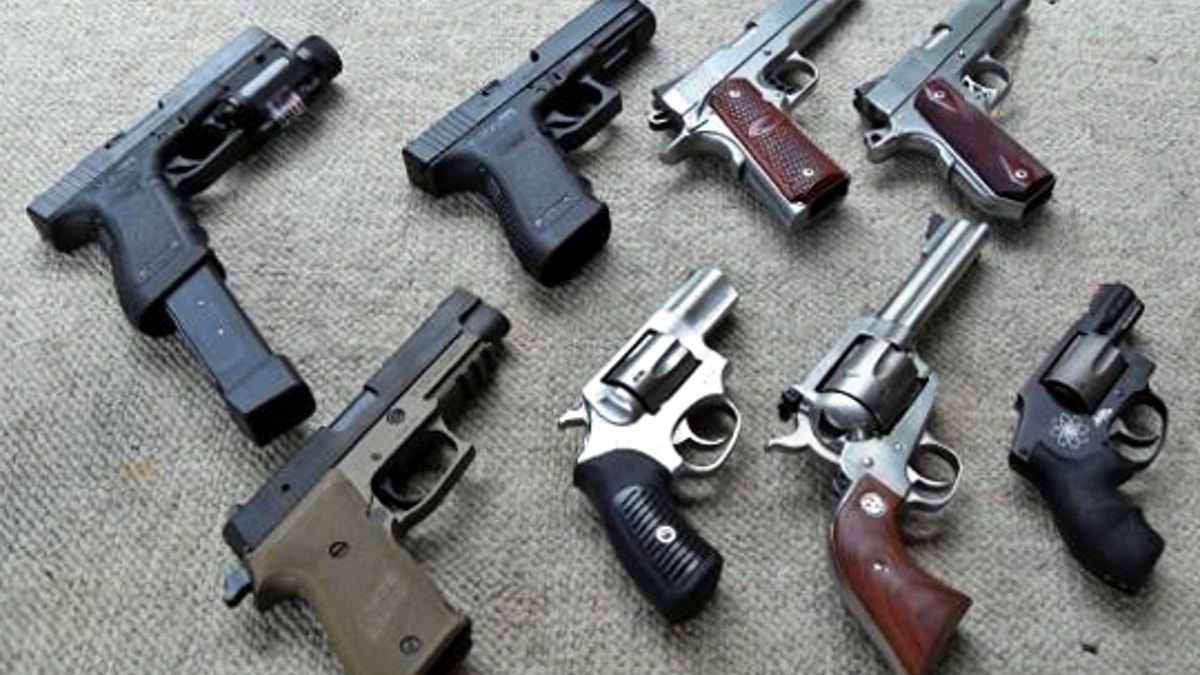
Semiautomatic handguns and revolvers (Creative Commons | Joshuashearn)
Gun owners looking for safety tips on the Web may not find what they need to know, a recent study suggests.
Most U.S. websites with information on guns do not include important guidelines on how to store guns safely and keep them out of reach of children, researchers report in the journal Injury Prevention.
"Firearm injury and death are unfortunately very common among U.S. children and adolescents," said lead author Dr. Katherine Freundlich of the University of Michigan in Ann Arbor, adding that one of the contributing factors is unsafe storage of guns in the home.
Guns are common in American households, with over a third possessing at least one gun, the study team notes.
The four key storage guidelines to keep children and teens safe from guns are: (1) keeping guns locked up and (2) unloaded, (3) keeping bullets locked up and (4) in a separate location from the guns, according to the researchers.
"We wanted to find out what information people will get if they try to use the Internet to learn about how to store guns and ammunition," Freundlich told Reuters Health by email.
The study team used a Google search of the 10 most common search terms in the United States related to gun and ammunition storage and found 87 relevant Web pages.
Two independent reviewers looked at the sites to determine whether they mentioned the four safety recommendations.
Only two Web pages mentioned all four of the gun storage guidelines.
On average, the websites described one or fewer of the four recommended storage practices.
The most commonly mentioned guidelines were locking guns up and storing them unloaded, with 7 percent of websites mentioning each of these rules. Only 3 percent of websites recommended storing bullets separately from guns, and that was the least mentioned practice.
Two of the websites made statements that went against the recommendations, implying that loaded guns could be stored safely.
"By far the most common type of sites were retail sites, meaning sites designed to sell products such as firearms, safes, and other storage goods," Freundlich said.
Websites selling guns tended to have less safety information than educational or news websites mentioning guns. Retail sites were also significantly less likely to recommend that guns should be stored unloaded.
On average, information on the websites was written at an 8th grade reading level. Retail sites tended to be written at a slightly lower grade level and were less likely to give details about the sources of their information.
Carol Runyan, director of the Program for Injury Prevention, Education and Research based at the Colorado School of Public Health in Aurora, noted that gun deaths from suicide are of particular concern.
"Keeping guns out of homes or at least locked up will help people going through a crisis from making a quick and irreversible decision to end their lives," Runyan, who was not involved in the study, said by email.
It may not be enough to simply talk to children about gun safety, she added. "Children are curious and, even if told repeatedly to stay away from guns that they encounter, (they) cannot be counted on not to continue to explore," Runyan said.
Parents should not only lock up their own guns but also ask about safe gun storage when sending children to visit another person's house, she advised.
"Just as parents should be careful about not leaving prescription medications or alcohol available to unsupervized teens, they should be careful about being sure firearms are stored safely," Runyan said.
People also should look beyond the Internet for advice, she said. "Information on websites can be incomplete or flawed, so it is important when dangers are high to search carefully and seek expert guidance."
"Anyone who is interested in storing firearms or ammunition as safely as possible should follow the four guidelines," Freundlich said.








































